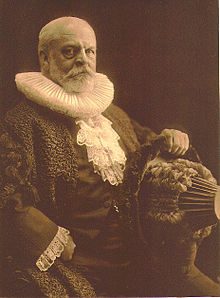Heinrich Traun
Heinrich Traun (born May 8, 1838 in Hamburg ; † September 10, 1909 there ) was a Hamburg manufacturer and social politician . From 1901 to 1908 he was a Hamburg Senator.
origin
Traun comes from a very wealthy family, his mother Bertha nee. Meyer (1818–1863) was a daughter of the industrialist Heinrich Christian Meyer . At the age of 16 she had to marry Friedrich Traun , who later became a close colleague of her father. The marriage had six children. In 1851 Bertha separated from Friedrich Traun and moved to London with her youngest three children . In the same year she married Johannes Ronge , the founder of the Free Religious Movement , whom she had met in 1846.
Life and politics
Traun went to school in Hamburg and after studying to become a Dr. phil. he joined the Harburger Gummi-Kamm-Compagnie led by his father Friedrich Traun and Heinrich Adolph Meyer . In 1864 Heinrich Adolph Meyer founded his own business. After two executive members left the Harburger Gummi-Kamm-Compagnie in 1870 and founded the New-York Hamburger Gummi-Waaren Compagnie , Traun took over all shares of the Harburger Gummi-Kamm-Compagnie in 1878 and later renamed the company Dr. Heinrich Traun Gummiwaren around. The company was very successful and in 1910 had around 2,400 employees. 1901 Traun left the management to his sons, the company was in Heinr. Renamed Traun & Sons .
In addition to his successful industrial activity, Traun was also active as a social politician. In his company, his workers were granted more social benefits than were customary at the time. Since the 1970s, for example, there have been health and death funds. In addition, Traun tried to improve the housing situation for low-wage earners; he was involved in the Hamburger Bau- und Sparverein, a non-profit housing association founded in 1893. In addition, Traun was the founder of the Hamburger Volksheim based on the concept of the English Toynbee Hall . His support for the Protestant social worker and racial theorist Walther Classen was closely connected to the Volksheim education project . Because of this Volksheim engagement, Traun was later elected to the Senate. His sister-in-law Antonie Traun was also heavily involved in the women's movement for members of the working class.
In 1873 Traun was elected to the Hamburg parliament, to which he belonged until 1877. On February 1, 1901, Traun was elected to the Senate . He was a senator until his retirement on January 10, 1908.
His son Friedrich Adolf Traun was the first German Olympic medalist at the Olympic Summer Games in Athens in 1896 , he won the men's doubles in tennis .
Heinrich Traun was buried in the area of the family grave below Chapel 7 in the Ohlsdorf cemetery in Hamburg.
In the Hamburg district of Fuhlsbüttel , Heinrich – Traun – Strasse and Heinrich – Traun – Platz commemorate the senator and “sponsor of the Hamburg construction association” (inscription under the bust on Heinrich – Traun – Platz).
Individual evidence
- ↑ http://www.bau-verein.de/historie.htm
- ^ Adolf Buehl : From the old council chamber: Memories 1905 - 1918, Hamburg 1973, p. 9
- ↑ Archive link ( Memento of the original from October 7, 2007 in the Internet Archive ) Info: The archive link was inserted automatically and has not yet been checked. Please check the original and archive link according to the instructions and then remove this notice.
- ^ Adolf Buehl: From the old council chamber: Memories 1905 - 1918, Hamburg 1973, p. 61
- ↑ Historical photo of Heinrich – Traun – Strasse and –Platz
swell
- Fuhrmann, Rainer: Distribution of offices in the Senate 1860-1945, typescript, Hamburg State Archives.
| personal data | |
|---|---|
| SURNAME | Traun, Heinrich |
| BRIEF DESCRIPTION | German industrialist and politician, Member of the Bundestag, Senator |
| DATE OF BIRTH | May 8, 1838 |
| PLACE OF BIRTH | Hamburg |
| DATE OF DEATH | September 10, 1909 |
| Place of death | Hamburg |


